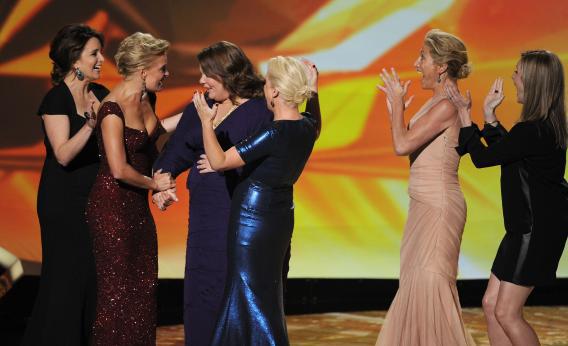The recent explosion of prominent women in comedy has brought with it an unfortunate but predictable debate about whether or not the characters that have resulted from all these women scribbling and acting are Good For Women. Of course, the underlying assumption of the question is that women have a bad reputation in the general public and media should therefore portray us in uplifting ways to counter negative stereotypes, which in turn means that the question answers itself: If a female character has flaws, then that is Bad For Women. Indeed, that’s been the general consensus of all hand-wringing over this question. Silpa Kovvali, writing at Feministing, denounces Bridesmaids because some of the characters are insecure, some are unhappy, and some indulge at times in petty, vindicative behavior. Emily Nussbaum at The New Yorker rounds up similar concerns about the character Liz Lemon on 30 Rock, including Slate’s Sam Adams complaining that Liz Lemon has gone the way of Homer Simpson. This parade of female slobs, neurotics, and discontents is setting a lot of teeth on edge. Why can’t we have spunky heroines with inconsequential flaws, so we can all look up to them?
Because that’s boring is why. Nussbaum defends Lemon against detractors, pointing out correctly that the character has always been a sharp satirical deconstruction of the Mary Richards-style spunky heroine:
Because from the beginning Liz Lemon was pathetic. That was what was enthralling, and even revolutionary, about the character. Unlike some other adorkable or slutty-fabulous characters I could name, Liz only superficially resembled the protagonist of a romantic comedy, ready to remove her glasses and be loved. Beneath that, she was something way more interesting: a strange, specific, workaholic, NPR-worshipping, white-guilt-infected, sardonic, curmudgeonly, hyper-nerdy New Yorker.
Nussbaum points out that the reason that Lemon’s flaws have intensified over time is that Lemon is actually on a journey of self-acceptance, realizing that she is less Mary Richards and more George Costanza, and learning to be okay with that. Looked at from that angle, 30 Rock embraces a far more radical feminism than those demanding more uplifting female characters want, one where female characters don’t have to be perfect to be acceptable, but can be accepted like male characters, as beloved because they’re so flawed. Like George Costanza—or even better, Larry David on Curb Your Enthusiasm—what makes Liz Lemon so fun to watch is she provides catharsis for the misanthrope lurking inside all of us.
It’s the same story with Bridesmaids. Comedy is about sending up human foibles, which generally means writers and actors exaggerate character flaws to make their point (and get the laughs). Bridesmaids worked so well because the jokes, however broad, rang true. Sure, few of us have gone to a bridal shower and destroyed a cheesy decoration in a fit of frustration with the unreality of it all, but who among us hasn’t wanted to? The problem for women in comedy is that they’re often not given enough opportunities to do what men do, which is to make fun of some of our less admirable traits. Feminists should celebrate that wall finally coming down, however slowly.
